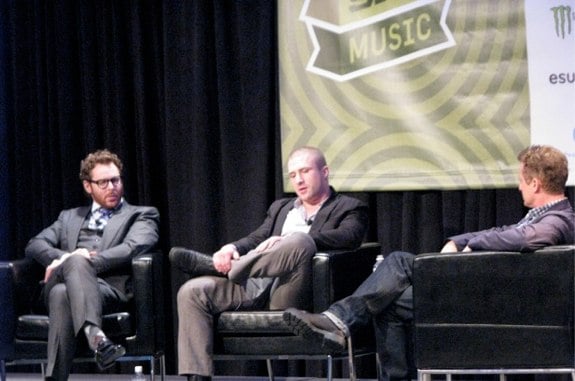Find Our Latest Video Reviews on YouTube!
If you want to stay on top of all of our video reviews of the latest tech, be sure to check out and subscribe to the Gear Live YouTube channel, hosted by Andru Edwards! It’s free!
Monday March 19, 2012 5:59 pm
Napster founders Sean Parker and Shawn Fanning talk digital music at SXSW

The revolutionary promise of digital music became reality with the rise of Napster. The file sharing network pioneered a functional and comprehensive catalog of music with its enthusiastic users. Developed by then-teenaged Shawn Fanning in 1998, Napster became a worldwide phenomenon in less than a year. Co-founder Sean Parker helped develop Napster into a company. Mass acceptance came quickly, but legal challenges ultimately doomed the original service. Despite the controversy and lawsuits, Napster changed the music business and paved the way for iTunes, Rhapsody, Spotify, and other music services. The divide between the cultural establishment and technology innovators was defined by the disputes raised by Napster. After more than a decade of declining sales of recorded music and imperfect attempts to present a licensed alternative, the influence of Napster continues to be felt.
At SXSW, I listened in on a discussion with Sean Parker and Shawn Fanning where they discussed these issues in an effort to promote their film Downloaded. The panel opened with a montage of clips from the VH1 rockDocs Downloaded film. The trailer touched on the start of Napster, the revelation of how easy it was to get music based on a search term, how quick the results were in the age of dial-up, and the growth of Napster as a company. There are a couple of gems there as well, such as when Fanning said back in 1999 that he believed the future was instant music access from multiple devices, including stereos and smartphones (well, he said "cell phones," but still.) this is a movie about kids revolutionizing an industry they knew nothing about.
The interesting thing about the relationship between Fanning and Parker is that they didn't meet face-to-face for quite a while, even while pitching investors.
Sean Parker spent six months building the software, eating, coding, and sleeping "on occasion." That was the satisfying part of Napster, staying creative and exciting. After the legal issues began, the innovation stopped and instead the company seemed to become a law firm - even the CEO was an attorney, and the legal case dictated the product, rather than the product dictating itself. It was just too early, and the market wasn't ready for it. The record labels were terrified of the idea of digital media, and it wasn't time for the conversation to succeed just yet.
One interesting point made during the dicussion: If Parker and Fanning had the business experience needed to make Napster a success prior to starting it, then the product would never have happened because it would have been too daunting, and they would have done something else. The fact that they didn't understand the road they had ahead of them made it so that they were willing to jump in.
From there, we went to the question and answer portion.
Question: Now that Shawn works with Spotify, is there anything missing from Spotify that you feel existed in Napster?
The piece that's missing from Spotify is the instantaneous chat, where you can share music and talk about it in real-time. It's being worked on now. You also can't watch other people browsing the files you personally have on your computer. You might want to know what the most popular songs in your library as among your friends, for example.
Question: If you could give advice to your younger selves knowing what you know now, what would it be?
Parker would not tell himself not to do it. Napster was an amazing learning experience in negotiating, hiring, building a business, etc. Market selection is incredibly important. Make the right decision about the market you want to go after, and then you'll work on things that have potential and can create broad change. Also, party hard, but not as hard as your CEO.
Question: Could you have accomplished what Spitify is doing today with Napster if you had a different approach?
The music industry, like Hollywood, is a huge American industry that other countries haven't been able to replicate. They are gatekeepers though, and they are very insecure since the results are always unpredictable. Music is an intuitive, emotional thing, so it's hard to come up with an algorithm. That makes it unpredictable, closed, and insular. Very different from the open, accepting world of Silicon Valley, where the newcomer was always embraced and educated. That said, they really didn't have the tools or experience to have the negotiations with the people who simply didn't want any change. In order to be successful, legislative change to the DMCA would have been needed.
Question: Napster made thing great for the fans, Spotify great for fans and labels. What about the artists and writers?
Parker says there is definitely a dissent brewing between labels, publishing companies, and artists. It has to do with old licensing schemes that still persist, and a lot of artists have contracts that don't pay them for anything that happens online, including on streaming music services. These things have to be resolved, and iTunes and Spotify have been bringing that to the foreground, but it is really between the artist and the label. “There’s definitely some sort of dissent brewing between record labels, publishing companies and artists [about the compensation they get from streaming services]...Spotify is returning a HUGE amount of money [to the record labels]. If we continue growing at our current rate in terms of subscriptions and downloads, we’ll overtake iTunes in terms of contributions to the recorded music business in under two years.”











